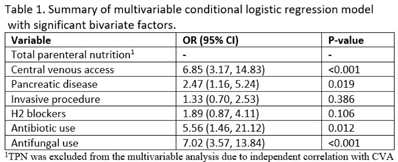No CrossRef data available.
Article contents
Risk factors for candidemia: A case–control study
Published online by Cambridge University Press: 16 May 2022
Abstract
Background:Candida bloodstream infections (candidemia) have significant mortality and morbidity rates, as well as healthcare cost implications. Emerging multidrug-resistant Candida spp such as Candida auris, as well as increasing resistance among non–albicans species, which are becoming more prevalent, also raise concern. Understanding the epidemiology of this infection could enhance prevention and management efforts. We studied risk factors for candidemia. Methods: This matched case–control study was conducted at a university hospital from December 2019 through May 2021. Cases of candidemia were identified using positive blood-culture results. Controls were matched 5:1 to cases by age, sex, and month and year of admission. Risk factors of interest included total parenteral nutrition (TPN), central venous access (CVA), neutropenia, Clostridium difficile, pancreatic disease, Candida in urine culture, cancer, invasive procedures, H2 blockers, chemotherapy, antibiotic use, immunosuppression, and antifungal use. Bivariate conditional logistic regression models were used to study the association of individual factors with candidemia. Multivariable conditional logistic regression models were performed using factors with a P Results: Overall, 101 patients with candidemia and 505 matched controls were included. In the bivariate analysis, associations were detected between candidemia and TPN, CVA, pancreatic disease, invasive procedures, H2 blocker use, antibiotic use, and antifungal use (all Ps Conclusions: Associations of candidemia with recent antifungal use and pancreatic disease were relatively novel findings. Neutropenia was not an independent risk factor for candidemia in this study. Future directions include further evaluations of previous antifungal use in patients with candidemia to identify opportunities for possible intervention and antifungal stewardship.
Funding: None
Disclosures: None

- Type
- Other
- Information
- Antimicrobial Stewardship & Healthcare Epidemiology , Volume 2 , Issue S1: SHEA Spring 2022 Abstracts , July 2022 , pp. s56 - s57
- Creative Commons
- This is an Open Access article, distributed under the terms of the Creative Commons Attribution licence (http://creativecommons.org/licenses/by/4.0/), which permits unrestricted re-use, distribution, and reproduction in any medium, provided the original work is properly cited.
- Copyright
- © The Author(s), 2022. Published by Cambridge University Press on behalf of The Society for Healthcare Epidemiology of America




